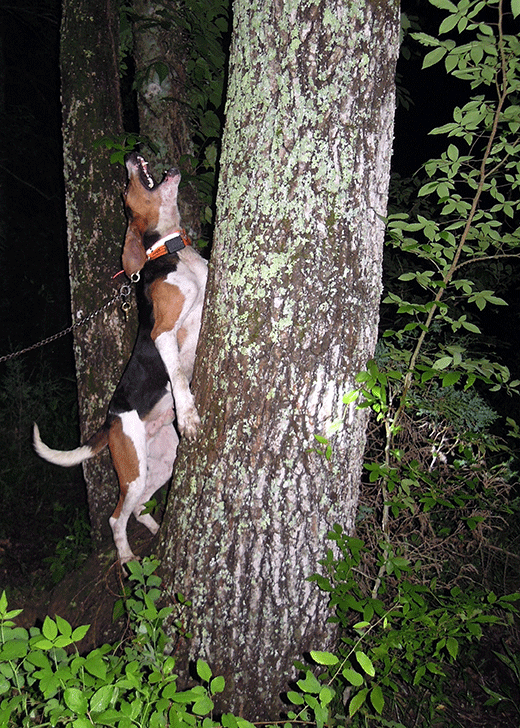Running with the hounds in a sport dating back centuries
By John N. Felsher

runs strong in the blood and genes of
coon dogs. Good dogs inherently track raccoons because of their breeding.
Nearly a mile deep into the woods, dogs started barking excitedly.
“He’s got one treed! Let’s go,” says Sam Hatton, one of the dog owners.
With help from GPS systems on the dog collars telling us their exact location, we rushed off into the night as heavy fog dripping with humidity seemingly oozed up from any watery patch punctuating this wilderness south of Tuscumbia, Ala. Armed only with headlights, my son Daniel and I joined Sam, his brother Franky, and Wesley Coan to seek raccoons lurking in the darkness. As we crashed through thickets to reach the frenzied dogs, Sam and Wesley argued over whose dog first sounded the alert in a friendly, yet spirited competition between longtime friends who would do anything for the other – except let him get to a raccoon first!
“Coon hunting is all about the dogs and who has the best dog,” Franky says. “Owners know the sound of their dogs and can tell what the dog is doing by how it sounds. To me, listening to dogs is no different than talking to someone on the phone. If someone I know calls me, I hear the voice and know immediately who it is. Each dog also has its own voice.”
As we approached the fray, the barking and howling grew much more intense – and not just from Sam and Wesley! At the base of a tall oak tree, the leaping dogs bayed with agitated cadence to tell us that a raccoon hid somewhere in the spreading canopy and gnarled branches pockmarked with holes. We each shined our lights up the tree to spot the masked bandits.
“It’s hard to see a smart old coon in a tree like this,” Sam says. “He can be anywhere looking down at us in all those leaves and branches. The dogs know he’s here somewhere. He might have slipped into one of those holes. Sometimes, coons close their eyes when the light hits them so we can’t see their eyes shining.”
After scrutinizing the tree for a while, Sam and Wesley recalled their dogs to put them back on the trail of other raccoons. During the next few hours, we slogged through the swamps and forests following the dogs as they treed several other cleaver ring-tailed raiders.
“We seldom kill coons,” Franky says. “It’s about the chase and training the hounds. Hides used to bring $30 to $40 apiece, but hides don’t bring nearly as much money any more. Raccoons can live anywhere. There are more coons today than ever. More people kill coons now to get rid of them than by actually going coon hunting. Many deer hunters kill coons that get into their food plots.”
The Hatton Brothers, Wesley and others who so passionately follow this sport maintain traditions dating back centuries. Most raccoon hunters started because their fathers, grandfathers and many other generations ran with the hounds.
“To coon hunt, someone must have a love for the sport and love for the dogs,” Franky says. “That’s just how I was raised. It gets in the blood. I started coon hunting with my father when I was four years old. His father taught him. My son now hunts with me. He’ll pass this tradition down to the next generation.”
Like the sportsmen who love them, hunting runs strong in the blood and genes of coon dogs. Good dogs inherently track raccoons because of their breeding. A great dog with superior bloodlines could cost more than most cars. Dog trainers need only hone those natural instincts, instill discipline and break dogs from chasing deer, rabbits or other game.
“These dogs are bred for this,” says David Crosby, a raccoon hunter from Sulligent. “All coon hunters have their own preference for dogs. Every dog is a little different. I love listening to the dogs running the coons and watching the dogs work. Coon hunting is about being with others hunters and seeing whose dog can strike the coon first and tree it.”
Most hunters train their own dogs. Some hunters pay more than $20,000 for others to train their dogs. Dogs can also learn from other dogs. Coon hunters often pair young dogs with experienced hounds.
“I always liked to hunt with someone who had a better dog than me because my dog would learn from another good dog,” says Virgil Miles, an 82-year-old hunter from Lauderdale County. “On a typical hunt, we’d have two or three dogs and three or four people. We’d put all the dogs out at once and listen. We’d hunt all night. Sometimes, we’d shoot squirrels in the morning and cook them for breakfast. It’s a great sport hunting with a good coon dog. I wish a lot more young people would get out into nature more.”
On private land, Alabama sportsmen can chase raccoons all year long without killing them. Sportsmen can kill raccoons from early September through the end of February each year on private lands, but seasons may vary on public properties.




